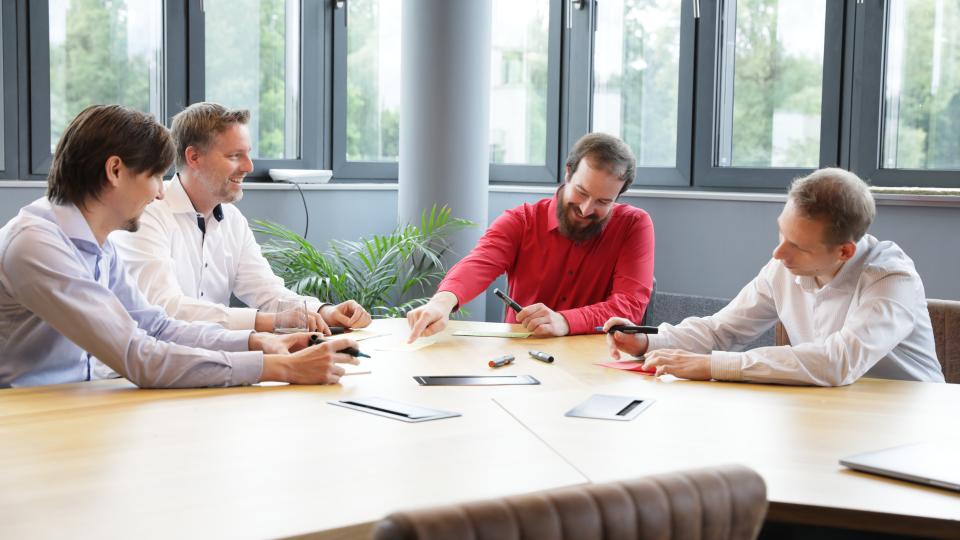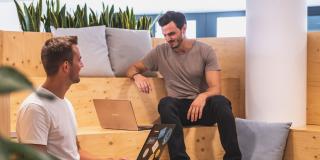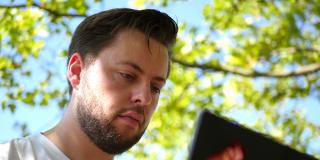
CodeShield supports software manufacturers in the screening of external software developments for security risks and integrating it securely into their own software. CodeShield thus automates the manual task of finding and eliminating vulnerabilities. The target group for the product is software manufacturers with sensitive data, such as banks or insurance companies.
CodeShield
Dr Johannes Späth
#NeueGründerzeit Nordrhein-Westfalen spoke to Dr Johannes Späth, co-founder of CodeShield, about the company’s initial success as a young business, proof of concept, employee recruitment and pitching experiences.
4 founders – 1 spin-off
Dr Johannes Späth: Our company only came into being at the beginning of 2020. We, that is me and my three co-founders, Manuel Benz, Andreas Dann and Prof. Eric Bodden, are a spin-off from the University of Paderborn and the Fraunhofer Institute for Mechatronic Systems Design IEM. Over the last approximately 2.5 years, we have become familiar with software technology and IT security through our cooperation in the research group. What unites us – perhaps also in terms of how a founding team should be established? Simple: we are able to get on with each other, even when conflicts arise. We think it is important to be open and honest with each other, although each person has their own tasks and areas of responsibility. Actually, you could compare us to a small football team – a common goal to which each person contributes. This works, although we all have a scientific/technical background. In fact, this background currently works to our advantage, which brings me to this tip for other people starting their own business: our technical background gives us credibility when it comes to conveying our expertise, enabling us to sell our product to the target group. This is important insofar as CodeShield is a product that plays a crucial role when it comes to trusting the supplier’s competence. However, we shall soon be integrating skills in the field of business development and sales within the team.
„My tip – even when you are dealing with large companies, you need patience and perseverance.“
En route to commercial viability – proof of concepts
Dr Johannes Späth: For us as a young business, it is important for our products to be commercially viable. We have already managed to demonstrate their technical feasibility through our analysis of open source projects – including the German coronavirus warning app, in which we successfully managed to identify security loopholes. We are also running initial proof of concepts with well-known companies and obtaining their feedback. We have scheduled a time window of three months for this. My tip – even when you are dealing with large companies, you need patience and perseverance. In parallel, we are dealing with the issues of follow-up financing and product development.
Financing and guidelines for the software development process
Dr Johannes Späth: Naturally, finance is an important issue for us. The general terms and conditions as a spin-off from the sciences are not bad. As a result of the University’s background and research programme, we have access to funds that are not available to other start-ups. The government has boosted the IT security sector, in particular with good funding programmes – this is currently essential in the face of the international competition in this field.
What we would all really like to see is legislation to support the establishment of standards in software development regarding quality and security. Quality and security are complementary to the thing that drives motivation in development: functionality. As a result, these factors are often neglected – particularly at management level. Open source solutions set an example in many respects, and enable external evaluation, which leads to higher quality and security.
„The important thing is to stay focused. We have had, and continue to have, so many ideas. But we always need to watch that we don’t become distracted.“
Employee recruitment
Dr Johannes Späth: Employee recruitment is a subject that naturally concerns us. Our proximity to the University provides us with a link to a good network of specialists. It is important for us to recruit employees with the relevant expertise at an early stage through industrial placements. Naturally, that is not enough, which is why we also need to recruit from elsewhere. One tip here: our business model and infrastructure enable us to work remotely. Consequently, we offer the proof of concept for new work. As business founders, we appreciate the merits of the mobile office and will also extend that opportunity to our employees. As an employer, we need to do that. Consequently, it has been convenient for us, as it enables us to cover different time zones that a future internationalisation strategy would require.
There is no such thing as pure success: challenges and learnings
Dr Johannes Späth: My third tip, which anyone starting their own business should heed: stay focused. We have had, and continue to have, so many ideas. But we always need to watch that we don’t become distracted. And so, to my fourth tip: you need to be very specific about your USP, particularly in the concept phase – in other words, you need to identify your product’s unique feature: the key aspect that makes it something people want to buy. That can be a challenge, but it’s a challenge you need to face.
If I’m asked why I am taking on the challenge of starting a business, I can only say that it’s because it gives me so much more freedom and more development opportunities. I can motivate myself to work, and to test and implement ideas quickly. Perhaps my answer will be different in a few years’ time, when my life situation has changed, and if I have to take on more responsibility for employees who have families and need social or financial security, which they will expect us to provide.
To begin with, however, in the months ahead our challenges are to find more good people to work for us, obtain support on the issues of business development and sales – as we are not yet really in the position we would like to be – and to develop an internationalisation strategy in the future.
As it is also an exciting time for other business founders in this position, I’ll close with a final tip on what we would do differently now, if we had the opportunity of doing it all again: pitches should not be approached on the basis of democratic equality. For our first pitch, the three of us stood in front of a jury and each one of us spoke for 1.5 minutes. We would definitely do that differently now: whichever member of our team has the best pitching skills would be the one to do it – in a game of football, one goalkeeper is usually all you need. That person would make sure that they were well-prepared and would go into the pitch alone – so that would be a clear indication of “all for one, and one for all”.



Social media settings
By activating these fields by clicking, information will be send to the following services and saved there:
Facebook, X, YouTube, Google, Pinterest, Instagram, Flickr, Vimeo
Please read carefully our notes and information on Data Privacy and Netiquette (in German) before you activate individual social media.
Activate data feeds from Social Networks permanently and consent to data transfer: